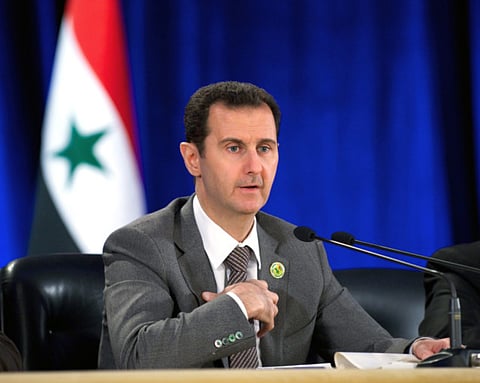Another Bashar Al Assad re-election
How country could hold presidential poll under existing circumstances is a mystery

Beirut: Three years into a grinding civil war, Syrians speculated about their leadership, unsure whether President Bashar Al Assad was in full control.
His infrequent public appearances led many to wonder if the head of state was in charge or whether a tighter group of Baath Party leaders held the country’s helm. Others speculated that Al Assad was quietly preparing for re-election next July, guaranteed to win a landslide just as in the past.
Although the Syrian president delivered several television interviews during the past few years, his last public appearance was on January 13, 2014, as state broadcasts showed him offering prayers at a Damascus mosque to mark the birth of the Prophet Mohammed (PBUH).
Previously, he was last seen in public in the same Hassiba Mosque on October 15, 2013, to mark Eid Al Adha.
In fact, observers noted that Al Assad ventured into the public on religious holidays, since he was also seen at the mosque on August 8, 2013, this time for the Eid Al Fitr celebration. His rare non-religious outings included a May 1, 2013 visit to a Damascus power station, and an educational centre in the Al Tijarah neighbourhood in the capital to portray him as an accessible “man of the people”.
Many observers believe that powerful generals in the Syrian Army never trusted Al Assad, and lost confidence in his intrinsic abilities to lead.
It was his uncle, Rif’at who once described his nephew’s rise to power as “a knife in the back of the Syrian nation” — and putative rivals like the progeny of former defence minister Mustafa Tlas who backed the status quo.
However, as long as Al Assad toed the party line, his backing was ensured. The old guard, still devoted to the status quo, watched over him as relations with the vast majority of Arab regimes deteriorated although Syria hung on to its strategic alliance with Iran.
What was remarkable was that senior political, security, and military personnel remained stagnant, even when figures changed.
Deputy chief of staff Hasan Turkamani replaced chief of staff Ali Aslan in January 2002, for example, though many more younger party hacks and Ba’ath officials replaced old guard party hacks and officials. With the exception of his brother Maher, Bashar Al Assad could rely on no one, a fact that became brutally evident in the past three years.
With Maher sidelined, his sister Bushrah and her husband Asaf Shawkat out of the picture, the Al Assad clan lost its core unity, which allowed party minions to rule behind the scenes. Indeed, and as the uprising gained momentum, it was safe to conclude that those who ruled Syria in 2014 were Alawite generals, senior government bureaucrats and party activists.
Sign up for the Daily Briefing
Get the latest news and updates straight to your inbox



